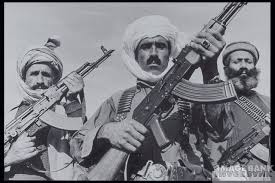During Obama’s election campaign, he often stated that we should be focusing our middle-east military operations on Afghanistan. Were he to be elected, this would become US military direction in that part of the world.
I mark the beginning of our challenges and costs in that general region (Kuwait notwithstanding), the day we moved from strike mode to occupation-nation-building mode in Iraq.
As an ex-military officer with a solid understanding of history and politics, expanding the campaign in that way was high-risk, and, yet again, deploying military force in support of utopian ideals. Many of my equally patriotic readers may disagree with this at some level.
Afghanistan is another “war of choice”, and I feel the same way about Afghanistan as I did about Iraq, only more strongly. Here is the logic. (this is an equal-opportunity offender posting)
Content: The President, Current Military Situation, The Opium Problem, History of Afghan Campaigns, Five Big Questions, Can We Afford It?
The President
We have an untested individual in the oval office whose only legitimate claims to fame are his supposed intellect, oratory skills, and a successful election campaign. I have no doubt that he will approach major decisions in some sort of logical manner. But beyond that, it is a toss-up.
Is he less equipped than his predecessors? Depends on how one measures it. What is clear with Obama is that outside of his domestic/social political ideals, he displays the lack of anchorage one often sees in young, naïve, cosseted, ambitious individuals. I can find no objective evidence that he understands nation struggle and the meaning of genuine evil outside of how that applies to doctrinaire social issues. Wars led by such people, do not inspire confidence.
Current Military Situation
Knowledgeable military officers returning from Afghanistan indicate that the Taliban has returned to a strong position; that things are heading in the wrong direction. This was largely the situation in Iraq before that surge. But at that point we were armpit deep in the conflict in every way. We still have a choice in Afghanistan.
The Opium Problem
This is the economic life-blood of Afghanistan. I guess we could purchase their crops and convert them to morphine, but is that really a sustainable model ten or twenty years from now? Human nature being what it is, would they not see our purchases as a simple addition to what they already sell? Would an opium-buying strategy really stop the Taliban from taking over that country?
Knotty questions, fraught with uncertainty. The personnel and financial commitment from the US with this strategy would only change shape – a bit.
 History of Afghan Campaigns
History of Afghan Campaigns
Afghanistan was founded in 1747 and is roughly the size of Texas, but nowhere near as conducive to tank assault and the use of heavy artillery (these and air support are the Infantry’s best friends). It is a violent, tribal society with 27% illiteracy, 40% unemployment, and 80 political parties. It has been predominately Muslim since 1982.
They live a hard-scrabble existence, being armed is a sign of manhood and everyone is accustomed to adversity. They also have supportive friends that are not ours and will generally take the best of what is on offer.
Alexander the Great barely conquered the Afghan region. Having closely survived a tribesman’s arrow, he negotiated peace. In 1842, a British expeditionary force of 15,000 was slaughtered, save one who returned to tell the tale. Russia was there for 10 years starting in 1979 and could not win. They were seriously considering cutting their losses when our supplying Stinger missiles against their attack helicopters hastened the inevitable.
Through all this and more, the Afghans remain as they have always been. It is often called the, “graveyard of empires”. Undertaking the pacification of this place is high-risk. Anyone thinking otherwise is delusional, arrogant, naïve or all of the above.
Five Big Questions
- What is the U.S. national interest in Afghanistan?
- What is the strategy for Afghanistan and Pakistan?
- What would the specific objectives be for further engagement in Afghanistan?
- Is there a time frame of engagement and does that support the objectives?
- What is the exit strategy?
Can We Afford an Afghanistan War?
Well, I don’t know. What do you think?
______
This post was inspired by Stefan Halper’s article in the March 09 edition of The American Spectator, “Avoiding Disaster in Afghanistan” and Angelo M. Codevilla’s article, “Osama Bin Elvis”, of the same issue.